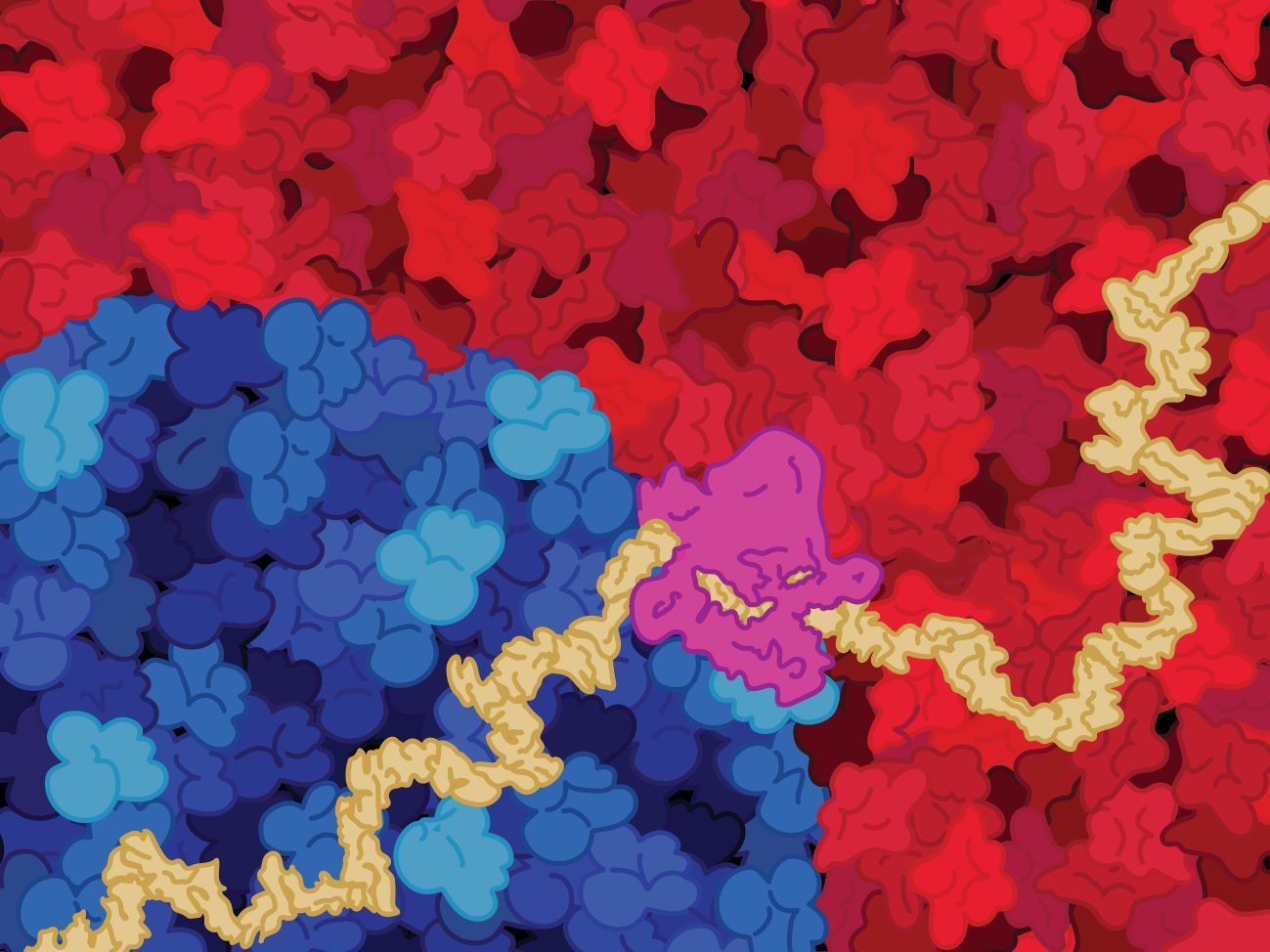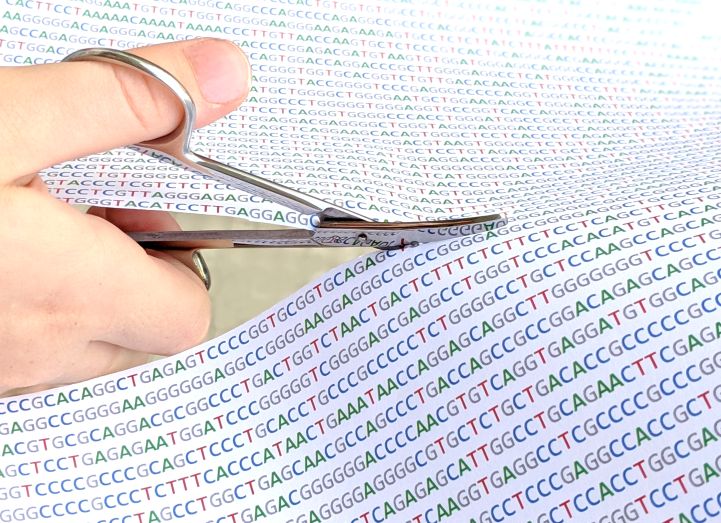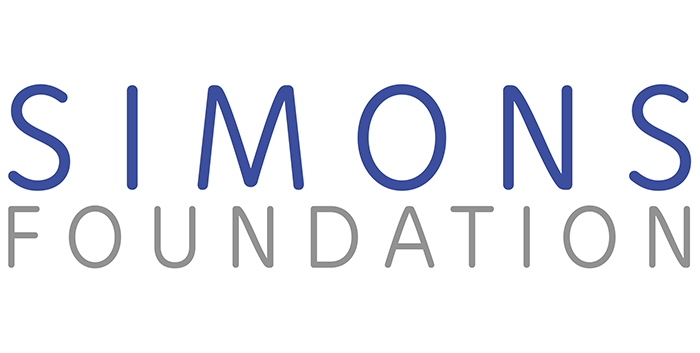My lab uses interpretable machine learning techniques to derive insights into biological processes. Although they provide good predictions, typical machine learning models are 'black box' and as a result do not help advance our understanding of biology. Without a good understanding of the underlying processes, generalizing beyond the dataset (to other cell types, developmental states, diseases contexts, etc.) is nearly impossible. By designing our models with interpretability in mind, we are able to 'observe' molecular processes such as RNA processing or translation at the level of individual protein-nucleic acid interactions, resulting in novel models. My other work is in mathematics, cryptography, and quantum computation. My main contribution there is to lattice-based cryptography, and specifically the Learning With Errors problem, forming the basis of post-quantum cryptography.
News
- 2026/02: Mauricio's paper with the Fei lab accepted to NAR
- 2025/08: Our NSF MFB proposal with Jef Boeke on probing ribosome organization got funded
- 2025/06: Congratulations to Simon Liu for winning the NSF GRFP!
- 2023/10: Our NSF proposal with Jingyi Fei on understanding splicing through synthetic datasets and imaging got funded
- 2023/10: NIH proposal (with Jef Boeke as PI) on using machine learning to assemble big DNA got funded
- 2023/10: Our work on quantum factoring algorithms was covered in Science Magazine
- 2022/9: Our NIH proposal on antisense oligo therapy for nonsense mutations got funded
- 2022/9: Our NSF proposal with Shu-Bing Qian on deciphering RNA regulatory logic with interpretable machine learning got funded
- If you would like to serve as a grader or tutor for a course I teach, please fill out this form. Do not contact by email.
- 2022/7: We are hiring! Undergraduate, graduate students, and postdocs with interest in using machine learning for discovery in biological sciences should apply. Strong drive is a must. We are also hiring postdocs in theoretical computer science with a deadline in late August so please apply early.
- 2022/10: Congratulations to Susan for winning the Single Ventricle Research Fund from Additional Ventures.
- 2021/9: Faculty Fellow Mauricio Arias joins the lab after research at Columbia University. Welcome Mauricio!
- 2020/9: Congratulations to Susan for winning the Life Sciences Research Foundation award
Research
 Elizabeth Speiser
Phase separation driving RNA logic: We proposed a model for RNA processing at the interface of two biomolecular condensates, arguing that interfaces of phase-separated condensates have functional roles in spatially organizing biochemical reactions. We also explore how phase separation can lead to unique biological ``threshold'' codes, such as those seen in RNA splicing.
We are currently investigating this model using a combination of computational and imaging techniques.
Elizabeth Speiser
Phase separation driving RNA logic: We proposed a model for RNA processing at the interface of two biomolecular condensates, arguing that interfaces of phase-separated condensates have functional roles in spatially organizing biochemical reactions. We also explore how phase separation can lead to unique biological ``threshold'' codes, such as those seen in RNA splicing.
We are currently investigating this model using a combination of computational and imaging techniques.
 Splicing code: Genes in our genome contain long introns that are removed in a process called splicing.
The sequence features that demarcate those introns are highly intricate and
are known as the splicing code.
In our lab, we combine high-throughput
experiments with interpretable machine learning analysis to gain insight into this
remarkable process. We are particularly interested in changes in splicing occurring during development. These results can have implications to human disease and therapeutics.
Splicing code: Genes in our genome contain long introns that are removed in a process called splicing.
The sequence features that demarcate those introns are highly intricate and
are known as the splicing code.
In our lab, we combine high-throughput
experiments with interpretable machine learning analysis to gain insight into this
remarkable process. We are particularly interested in changes in splicing occurring during development. These results can have implications to human disease and therapeutics.
 Mathematical and cryptographic aspects of lattices:
A main focus of our research is on lattice-based cryptography,
and specifically, the Learning With Errors (LWE) problem.
Lattice-based cryptography offers many advantages over traditional number-theoretic
cryptography, including its conjectured security against quantum computers,
making it one of the leading candidates for post-quantum (or quantum-resistant) cryptography. It is also incredibly versatile, allowing the construction
of advanced cryptographic protocols like fully homomorphic encryption.
Mathematical and cryptographic aspects of lattices:
A main focus of our research is on lattice-based cryptography,
and specifically, the Learning With Errors (LWE) problem.
Lattice-based cryptography offers many advantages over traditional number-theoretic
cryptography, including its conjectured security against quantum computers,
making it one of the leading candidates for post-quantum (or quantum-resistant) cryptography. It is also incredibly versatile, allowing the construction
of advanced cryptographic protocols like fully homomorphic encryption.
Lab Members
Postdocs
- Mauricio A. Arias (Research Scientist; Ph.D. 2013, Columbia University)
- Susan E. Liao (Assistant Professor/Faculty Fellow; Ph.D. 2019, Johns Hopkins; funded by Additional Ventures (previously the Life Sciences Research Foundation and the Lalor Foundation)
Ph.D.
- Arush Ramteke (2025-)
- Simon Liu (2024-)
- Avery Dunn (2024-; with Jef Boeke)
Undergrad and MS
- Joyce Xie (2025-2026)
- Wenjing Zhang (2025-2026)
Alumni
Postdocs
- Jeroen Zuiddam (Ph.D. 2018, University of Amsterdam)
- Young Kun Ko, joint with Subhash Khot (Ph.D. 2018, Princeton)
- Euiwoong Lee, joint with Subhash Khot (Ph.D. 2017, CMU; assistant professor, UMich)
- Omri Weinstein (Ph.D. 2015, Princeton; assistant professor, Columbia)
- Aravindan Vijayaraghavan (Ph.D. 2013, Princeton; assistant professor, Northwestern)
- Anindya De (Ph.D. 2013, UC Berkeley; assistant professor, Northwestern)
- Jop Briët, joint with Assaf Naor (Ph.D. 2011, CWI, Amsterdam; researcher, CWI, Amsterdam)
- Daniel Dadush, joint with Assaf Naor (Ph.D. 2012, Georgia Tech; researcher, CWI, Amsterdam)
- Divesh Aggarwal, joint with Yevgeniy Dodis (Ph.D. 2012, ETH Zurich; assistant professor, NUS)
- Vadim Lyubashevsky (Ph.D. 2008, UC San Diego; researcher in IBM Zurich)
- Dan Gutfreund (Ph.D. 2005, Hebrew University; researcher in IBM Cambridge)
Ph.D.
- Allyn Muzhi Xu (2019-2023)
- Min Jae Song (2019-2023) (with Joan Bruna)
- Mukund Sudarshan (2022; with Subramanian and Ranganath; supported by the PhRMA Foundation)
- Shravas Rao (2018; Assistant Professor at Portland State)
- Alexander Golovnev (2017, with Yevgeniy Dodis; Assistant Professor at Georgetown University)
- Noah Stephens-Davidowitz (2017, with Yevgeniy Dodis; Assistant Professor in Cornell)
- Klim Efremenko (2012, with Amnon Ta-Shma; Associate Professor in Ben Gurion University)
- Ishay Haviv (2011; Associate Professor in the Academic College of Tel Aviv-Yaffo)
- Avi Ben-Aroya (2011, with Amnon Ta-Shma)
- Iftah Gamzu (2010, with Yossi Azar)
- Ricky Rosen (2010, with Ran Raz)
Undergrad and MS
- John Quigley
- Zijin Hu
- Elizabeth Wei
- Frank Liu
- Nicholas Wang
- Ivri Faitelson (honors CS/math double major, 2024)
- Chuanyang Jin (honors CS/math double major, 2024)
- Fiker Zewdie (Biology major, 2025)
- Brittany Bustos (Biology major, 2024)
- Panchi (Steven) Mei (CS major, 2022)
- Bob Junyi Zou (math major, 2021)
- Minjun Park (CS major, 2020)
- Yi Tang (CS MS, 2020)
- Guy Moshkovitz (MS, 2011)
- Michal Moshkovitz (MS, 2010, joint with Amir Shpilka)
- Liron Schiff (MS, 2008)
- Lior Eldar (MS, 2008)
- Ishay Haviv (MS, 2006)
- Ricky Rosen (MS, 2005)
Teaching
- Basic Algorithms, Fall 2025
- Quantum Computation, Fall 2025
Short Bio
Oded Regev is a Silver Professor in the Courant Institute of Mathematical Sciences of New York University. Prior to joining NYU, he was affiliated with Tel Aviv University and the École Normale Supérieure, Paris under the French National Centre for Scientific Research (CNRS). He received his Ph.D. in computer science from Tel Aviv University in 2001. He is the recipient of a European Research Council (ERC) Starting Grant in 2008, the 2018 Gödel Prize, the 2019 Simons Investigator award, as well as best paper awards in STOC 2003 and Eurocrypt 2006. His research areas include theoretical computer science, cryptography, quantum computation and complexity theory, as well as applications of machine learning for biological discovery. His main contributions to date are in the area of lattice-based cryptography, where he introduced several key concepts, including the Learning with Errors (LWE) problem and the use of Gaussian measures. His current work also focuses on using machine learning for scientific discovery, specifically, for generating and testing hypotheses about RNA processes in biology.
Professional activities
- Organizer and co-founder of TCS+, an online seminar series in theoretical computer science, accessible to the widest possible audience, and ensuring a carbon-free dissemination of ideas across the globe.
- Theory of Computing (Associate Editor-in-Chief)
- Program committee member in STOC 2004, CCC 2005, TCC 2007, ANTS 2008, STOC 2008, CCC 2009, STOC 2010, STOC 2012
Selected Publications
-
RNA localization to nuclear speckles follows splicing logic (link)
Li Wen, Mauricio A. Arias, Xinqi Fan, Joyce Xie, Sneha Paul, Susan E. Liao, Marek Sobczyk, Oded Regev*, Jingyi Fei*
Nucleic Acids Research, 2026. -
Dynamics of RNA localization to nuclear speckles are connected to splicing efficiency (link)
Jinjun Wu, Yu Xiao, Yunzheng Liu, Li Wen, Chuanyang Jin, Shun Liu, Sneha Paul, Chuan He, Oded Regev*, Jingyi Fei*
Science Advances, 2024. -
An Efficient Quantum Factoring Algorithm (link)
Oded Regev
Submitted, 2024. Quanta Magazine article. Science news. -
Deciphering RNA splicing logic with interpretable machine learning (link)
Susan E. Liao, Mukund Sudarshan, Oded Regev
PNAS 2023. -
Uncovering Distinct Peptide Charging Behaviors in Electrospray Ionization Mass (link)
Allyn Muzhi Xu, Lauren Clarissa Tang, Marko Jovanovic, and Oded Regev
Journal of the American Society for Mass Spectrometry, 2023 -
An integer parallelotope with small surface area (link)
Assaf Naor and Oded Regev
Journal of Functional Analysis, 2023. Quanta Magazine article. -
Nuclear speckle-localized RNAs exhibit preferential positioning and orientation (link)
Sneha Paul, Mauricio A. Arias, Li Wen, Susan E. Liao, Jiacheng Zhang, Xiaoshu Wang, Oded Regev*, and Jingyi Fei*
iScience 2024. -
Splicing at the phase-separated nuclear speckle interface: a model (link)
Susan E. Liao, Oded Regev
Nucleic Acids Research 2021 -
New bounds on the density of lattice coverings (link)
Or Ordentlich, Oded Regev, and Barak Weiss
Journal of the AMS -
A Reverse Minkowski Theorem (link)
Oded Regev, Noah Stephens-Davidowitz
STOC 2017. Annals of Math. -
Towards Strong Reverse Minkowski-type Inequalities for Lattices (link)
Daniel Dadush, Oded Regev
FOCS 2016 -
Counterexamples to a conjecture of Woods (link)
Oded Regev, Uri Shapira, Barak Weiss
Duke J Math -
Recovering Short Generators of Principal Ideals in Cyclotomic Rings (link)
Ronald Cramer, Léo Ducas, Chris Peikert, Oded Regev
EUROCRYPT 2016 -
Tight Hardness of the Non-commutative Grothendieck Problem (link)
Jop Briët, Oded Regev, Rishi Saket
FOCS 2015 -
Solving the Shortest Vector Problem in 2^n Time via Discrete Gaussian Sampling (link)
Divesh Aggarwal, Daniel Dadush, Oded Regev, Noah Stephens-Davidowitz
STOC 2015 -
On the Lattice Isomorphism Problem (link)
Ishay Haviv, Oded Regev
SODA 2014 -
Classical Hardness of Learning with Errors (link)
Zvika Brakerski, Adeline Langlois, Chris Peikert, Oded Regev, Damien Stehlé
STOC 2013 -
Efficient rounding for the noncommutative Grothendieck inequality (link)
Assaf Naor, Oded Regev, and Thomas Vidick
STOC 2013 -
Locally decodable codes and the failure of cotype for projective tensor products (link)
Jop Briët, Assaf Naor, Oded Regev
Electronic Research Announcements in Mathematical Sciences 19 (2012) 120--130 -
Quantum XOR Games (link)
Thomas Vidick, Oded Regev
CCC 2013 -
Elementary Proofs of Grothendieck Theorems for Completely Bounded Norms (link)
Thomas Vidick, Oded Regev
Journal of Operator Theory -
Entropy-based Bounds on Dimension Reduction in L1 (link)
Oded Regev
Israel Journal of Mathematics -
Quantum One-Way Communication can be Exponentially Stronger Than Classical Communication (link,pptx)
Bo'az Klartag, Oded Regev
STOC 2011 -
An Optimal Lower Bound on the Communication Complexity of Gap-Hamming-Distance (link,pptx)
Amit Chakrabarti, Oded Regev
STOC 2011 -
The Learning with Errors Problem (pdf,ppt)
Oded Regev
Invited survey in CCC 2010 -
Lattice Enumeration using Extreme Pruning
Nicolas Gama, Phong Q. Nguyen, Oded Regev
Eurocrypt 2010 -
On Ideal Lattices and Learning with Errors Over Rings (pdf,link)
Vadim Lyubashevsky, Chris Peikert, Oded Regev
Eurocrypt 2010 -
No Strong Parallel Repetition with Entangled and Non-signaling Provers (link)
Julia Kempe, Oded Regev
CCC 2010 -
Lattice-based Cryptography (pdf)
Daniele Micciancio, Oded Regev
Book chapter in Post-quantum Cryptography, D. J. Bernstein and J. Buchmann (eds.), Springer (2008) -
Unique Games with Entangled Provers are Easy (link,ppt)
Julia Kempe, Oded Regev, Ben Toner
SIAM Journal on Computing 39(7), pp. 3207--3229, 2010. Preliminary version in Proc. of FOCS 2008 -
Simulating Quantum Correlations with Finite Communication (link,ppt)
Oded Regev, Ben Toner
SIAM Journal on Computing 39(4), pp. 1562--1580, 2009. Preliminary version in Proc. of FOCS 2007 -
On the Complexity of Lattice Problems with Polynomial Approximation Factors (ps,pdf)
Oded Regev
Survey paper prepared for the LLL+25 conference. Appears in this book -
Tensor-based Hardness of the Shortest Vector Problem to within Almost Polynomial Factors (link)
Ishay Haviv, Oded Regev
Theory of Computing 8(23), pp. 513-531, 2012. Preliminary version in STOC 2007 -
Lattice-based Cryptography (ps,pdf,ppt)
Oded Regev
Tutorial given in CRYPTO 2006 -
Learning a Parallelepiped: Cryptanalysis of GGH and NTRU Signatures (pdf,ppt)
Phong Q. Nguyen, Oded Regev
Eurocrypt 2006 -
On the Hardness of Satisfiability with Bounded Occurrences in the Polynomial-Time Hierarchy (ps,pdf)
Ishay Haviv, Oded Regev, Amnon Ta-Shma
Theory of Computing 3(3), pp. 45-60, 2007. -
Conditional Hardness for Approximate Coloring (pdf)
Irit Dinur, Elchanan Mossel, Oded Regev
SIAM Journal on Computing 39(3), pp. 843--873, 2009. Preliminary version in Proc. of STOC 2006 -
On Lattices, Learning with Errors, Random Linear Codes, and Cryptography (pdf,ppt)
Oded Regev
Journal of the ACM 56(6), article 34, 2009. Preliminary version in Proc. of STOC 2005 -
The Complexity of the Local Hamiltonian Problem (link)
Julia Kempe, Alexei Kitaev, Oded Regev
SIAM Journal on Computing 35(5), pp. 1070-1097, 2006. Preliminary version in Proc. of FSTTCS 2004 -
A Subexponential Time Algorithm for the Dihedral Hidden Subgroup Problem with Polynomial Space (link)
Oded Regev
-
Worst-case to Average-case Reductions based on Gaussian Measures (ps,pdf)
Daniele Micciancio, Oded Regev
SIAM Journal on Computing 37(1) pp. 267-302, 2007. Preliminary version in Proc. of FOCS 2004 -
Randomised Nearest Neighbour Lower Bound (pdf)
Amit Chakrabarti, Oded Regev
SIAM Journal on Computing 39(5) pp. 1919-1940, 2010. Preliminary version in Proc. of FOCS 2004 -
Adiabatic Quantum Computation is Equivalent to Standard Quantum Computation (link)
Dorit Aharonov, Wim van Dam, Julia Kempe, Zeph Landau, Seth Lloyd, Oded Regev
SIAM Journal on Computing 37(1) pp. 166-194, 2007. Preliminary version in Proc. of FOCS 2004 -
New Lattice Based Cryptographic Constructions (psgz,pdf,ppt)
Oded Regev
Journal of the ACM 51(6), pp. 899-942, 2004. Preliminary version in Proc. of STOC 2003 -
Vertex Cover Might be Hard to Approximate to within 2-ε (ps,pdf)
Subhash Khot, Oded Regev
Journal of Computer and System Sciences 74(3), pp. 335-349, 2008. Preliminary version in Proc. of CCC 2003
Personal
- My brother is behind Flytrex, a drone delivery company
- A tiny script to help color blind people visualize fluorescence microscopy images
- The arXiv Abstract Generator



